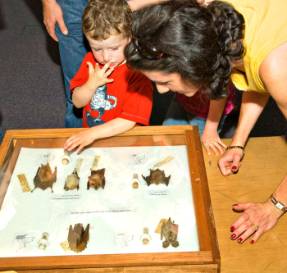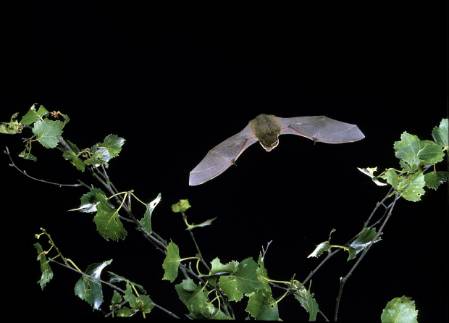If you want to discover some real stars of the night this Bank Holiday Weekend - as opposed to the festival rockers or carnival kind - flock to our Wildlife Garden for Bat Weekend on Saturday and Sunday, 28 and 29 August.
Three species of bat have been seen flying and feeding in the Museum's Wildlife Garden (Common pipestrelle, above, Soprano pipestrelle, and Daubenton's bat). Live bat photos here and below © Hugh Clark, Bat Conservation Trust
We join the European Bat Weekenders in a celebratiion of bats, giving 1000s of people across the country the chance to find out more about bats. The Bat Conservation Trust is urging everyone to go out and see and hear bats in their natural enviroment.
Highlights at our own weekend event include a bat treasure hunt round the garden, hands-on demonstrations from bat experts, including bat box building, and lots of batty crafts. Come and see a display of insects that bats feed on and visit the Bat Conservation Trust information tent on the front lawn. We have teamed up with the Bat Conservation Trust, our Centre for UK Biodiversity, and the OPAL team to bring you the event.
Batty talks are being held on Saturday and Sunday in the Attenborough Studio. See some of the speakers' featured bat specimens in the Darwin Centre atrium after the talks at 13.15 and 15.15.
Fingers crossed for some sunshine. Last year, we had a really popular event here (pictured below).
Find out more about our Bat Weekend. If you can't make it here, see what bat events are near you.
Any sightings of bats made over the weekend can be shared online on the Interactive Big Bat Map. Look out for the common pipestrelle (in flight above) and the brown long-eared bat (above right).

On Saturday, also watch out for the scary-looking Daubenton's bat featured online as our Species of the Day.
I leave you with a few bat facts:
There are 18 species of bat in the UK, 17 of which are known to breed here, accounting for more than a quarter of mammal species.
It is estimated that a pipistrelle bat can eat up to 3,000 insects in a single night! There are few other nocturnal insect-eaters, and a single insect-eating bat may eat 100s of insects a night.
Human activities have by far the greatest influence on bat populations. Loss of habitat for roosting and foraging has caused declines in bat populations. Intensive farming practices have led to a reduction in the abundance of insects which the bats rely on as their only food source.
Find out much more about bats on the Bat Conservation Trust website. Youngsters can join the Young Batworkers' Club, learn batty facts and find fund things to do.
Click on the images to enlarge them. Thanks to the Bat Conservation Trust for the live bat images.




